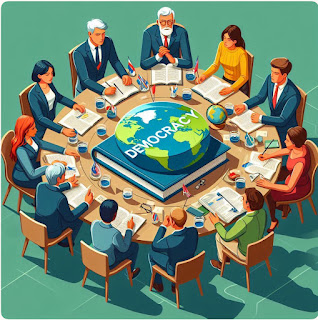Reshaping Democracy Governance System
Introduction
The current democratic system heavily relies on the election system, where people elect representatives from their communities or local influencers. However, this system often leads to conflicts, violence, war, and corruption. To address these issues, we propose an alternative voting system that utilizes advanced technology to create a more sustainable and inclusive democracy.
Summary
The proposed advanced democratic governance method involves a set of actors with specific responsibilities, fostering innovation and transparency. The system prioritizes deep relationships and clear communication between actors, the governance model, and citizens. By involving common people in the decision-making process, we aim to achieve inclusiveness, reduce corruption, violence, and inequality, ultimately leading to a sustainable future.
The Actors
The key actors in the proposed governance model include:
1. Corporate leaders
2. Politicians
3. Judges
4. Civil employees
5. Education institutions
6. Professionals
7. Old aged persons
Existing Election System
In the current system, all citizens who are eligible to vote elect their representatives through a common voting method every five years. These representatives then vote for their head representative using the same voting method.
Reshaping Election System
Head of State Selection Process :
After being selected by representatives from each district or taluk, an election is conducted in all educational institutions within the state or country. Students between the ages of 18 and 30 who are currently enrolled, along with district representatives, vote to choose the chief minister of the state.
Head of Country Selection Process :
Once the head of state is selected, a separate election is conducted in all corporations with revenues ranging from 1 million to 1 billion. These corporate leaders along with head of representatives vote to choose the head of the country.
Defense / Civil Employees Selection Process :
The heads of the army, navy, and air force of the country are elected through a separate process. An election is conducted in all courts, where judges from the district court to the Supreme Court vote to choose the defense leaders.
Benefits of this Governance Model
1. Inclusiveness between actors
2. Reduced corruption
3. Reduced violence
4. Reduced inequality
5. Sustainable future
Facts & Expected Outcome
Including social actors in the decision-making process will bring about significant changes in society.
1. Students will have the opportunity to express their needs, demands, problems, and challenges directly to the head of state selection process through their voting power.
2. Small, medium, and large corporate leaders will have a chance to express their requirements, policy goals, production values, and social issues directly to the head of country selection process through their voting power.
3. Judges will have the opportunity to share social issues, corruption, influencer threats, and justice problems directly with defense leaders through their voting power.
Problems to Solve
If any representative fails to earn enough votes from citizens or other social actors, the political and public policies must be changed until enough votes are obtained.
Conclusion
Creating an opportunity for citizens and other respected social actors to participate in decision-making will pave the way for a sustainable future for humans, the environment, and society.


%20(1).png)
Comments
Post a Comment